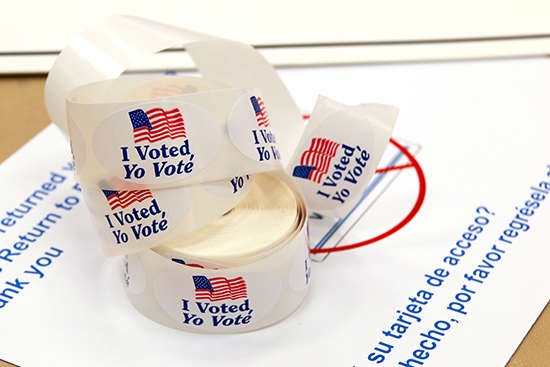
The U.S. Presidential Election will be held on Nov. 3, however early voting has started in several states. Photo from University of Albany.
As a ten-year-old child, I watched Donald Trump take the United States by storm and outperform all the polls and projections to become President. I was just as shocked as the rest of the world. How could someone so polarizing insult his way to the most powerful position in the country?
Trump was the fifth person to win the presidential general election despite losing the popular vote. He was just the second since Benjamin Harrison in 1888. However, this is not about Donald Trump or any of the other presidents elected in this manner. This is about the Electoral College; a flawed system established in the country’s earliest days on the foundation of slavery.
The current Electoral College format gives each state a varying number of electors that depend on the total number of senators and representatives in Congress. This means that each state gets at least three electoral votes for their two senators and one representative, regardless of size or population.
During the election, citizens of a state vote for a President. The candidate who gets the majority of the vote within the state earns all of those electoral votes. For example, if the Republican candidate in Arkansas wins 55% of the vote, they earn all six electoral votes for that state. There are 538 total electoral votes, which means a candidate needs 270 to win.
Since there are only two main political parties in the United States at this time, it is unlikely that either the Republican or Democratic candidate will fail to hit 270 in the near future. If it did happen, the vote would go to the House of Representatives.
This system narrows down the millions upon millions of votes for President to a much smaller number. It does it ineffectively, one that devalues the votes of certain Americans depending on their state, living situation, and partly race and ethnicity.
For your state, the value of your vote differs based on population because electoral votes depend on representatives in Congress. Yet, the number of representatives a state has in Congress is not directly proportional to their electoral votes.
Wyoming has three electoral votes and a population of 578,803. This corresponds to one electoral vote for 192,934 people. California has a population of 39,240,000 and makes up a whopping 54 electoral votes. Numbers are deceiving, however, as this is one electoral vote for every 726,666 citizens. Together, this means that one vote in Wyoming is worth 3.76 times more than one vote in California toward deciding the winner.
Another important thing to note is that this trend is similar throughout the nation, with more populated states having less value for each voter compared to rural ones. Because of this, the votes of racial minorities are not as valuable because they make up 20% more of the population in urban areas compared to rural areas, according to the United States Department of Agriculture.
While it can be said that not everyone is a voter and these numbers can be skewed because of that, the difference between those two states is inarguable. What is also inarguable is that the Electoral College eliminates the votes of many.
This is best seen in “safe” Republican or Democrat states. For example, Kentucky is a strongly Republican state. Donald Trump took it by 25% over Joe Biden in 2020. Because all of the state’s electoral votes go to the winner, there is no point in voting as a Democrat there. In Massachusetts, it is the opposite; the state has gone strongly Democratic for many elections now. A vote for Trump in Massachusetts is like a vote for Biden in Kentucky –- you should have just stayed home.
The Electoral College came to be when the Constitution was drafted because there was difficulty deciding on how to elect the president. This solution was a compromise between the House of Representatives being the electors and a popular vote, as many senators thought that it would be difficult to hold a popular vote across such a “large and geographically diverse” nation, according to the National Park Service.
Regardless of the original intentions of the Electoral College, the system helped slave states in the South during the early years of the United States. With the Electoral College came the 3/5th Compromise, an agreement reached that would count slaves toward a state’s overall population and representation. The catch here is that slaves could not vote, which gave slave states more representation and electoral votes.
That might have contributed to the fact that ten of the first twelve presidents owned slaves, and no president would make a real charge toward the federal abolition of slavery until Abraham Lincoln — the 16th president — in 1861. Even when the 3/5th compromise was abolished in 1868 to count all towards representation, almost all of those former slaves were unable to read. This led to the induction of literacy tests and other discriminatory voting practices to prevent African-Americans from voting; these would not be outlawed until the Voting Rights Act of 1965.
As a 21st-century child, I have been exposed to plenty of political turmoil and distrust. I have witnessed the somewhat thoughtful, respectful presidential debates evolve into tumultuous mockeries of our country. I have witnessed people make death threats both online and in person to other people simply because of their political views. Something needs to change. The Electoral College is step one.
Removing the Electoral College goes against small government, and that is a downside for many people. But from what I know, this system has some serious flaws. My vote does not count the same as Joe from Minnesota’s. A black man in New York City does not hold the same power as a white man in rural Montana. A Kentucky Democrat’s vote is useless, just like a Connecticut Republican’s vote.
Let’s drop this system that helped contribute to keeping slavery afloat for three-quarters of a century. Let’s drop this system that holds the power of minority votes at a different standard than white votes. Let’s drop this system that silences the voice of political underdogs. A true democracy gives everyone a say. Let’s give it a shot.



